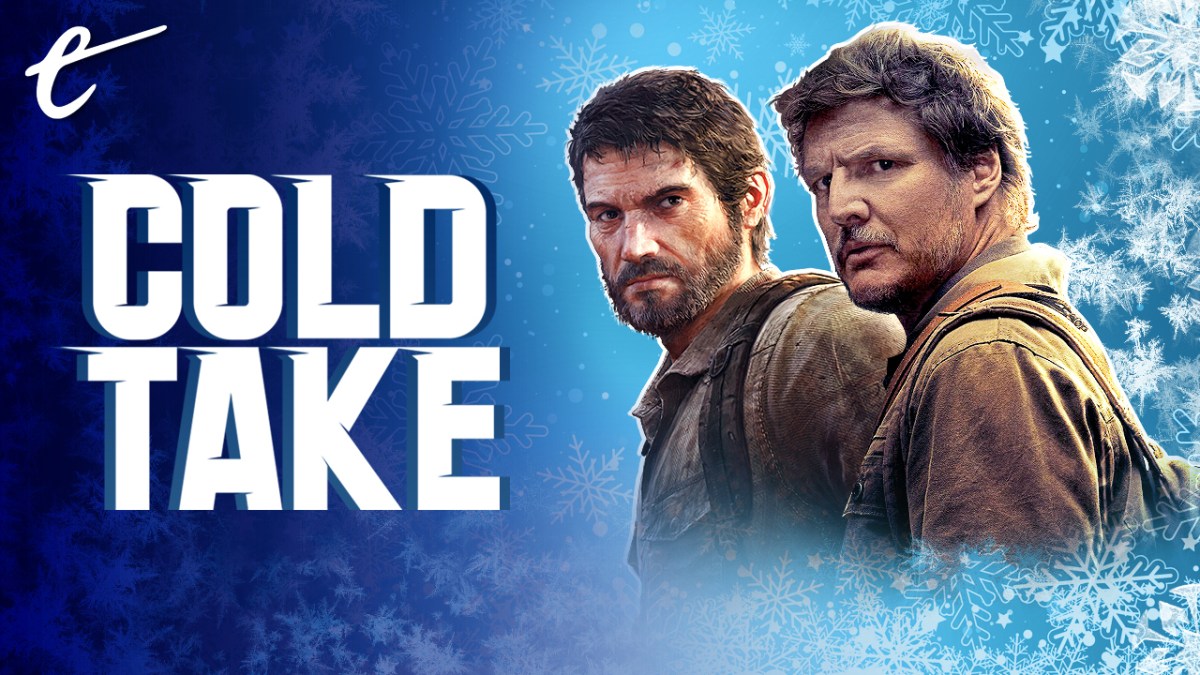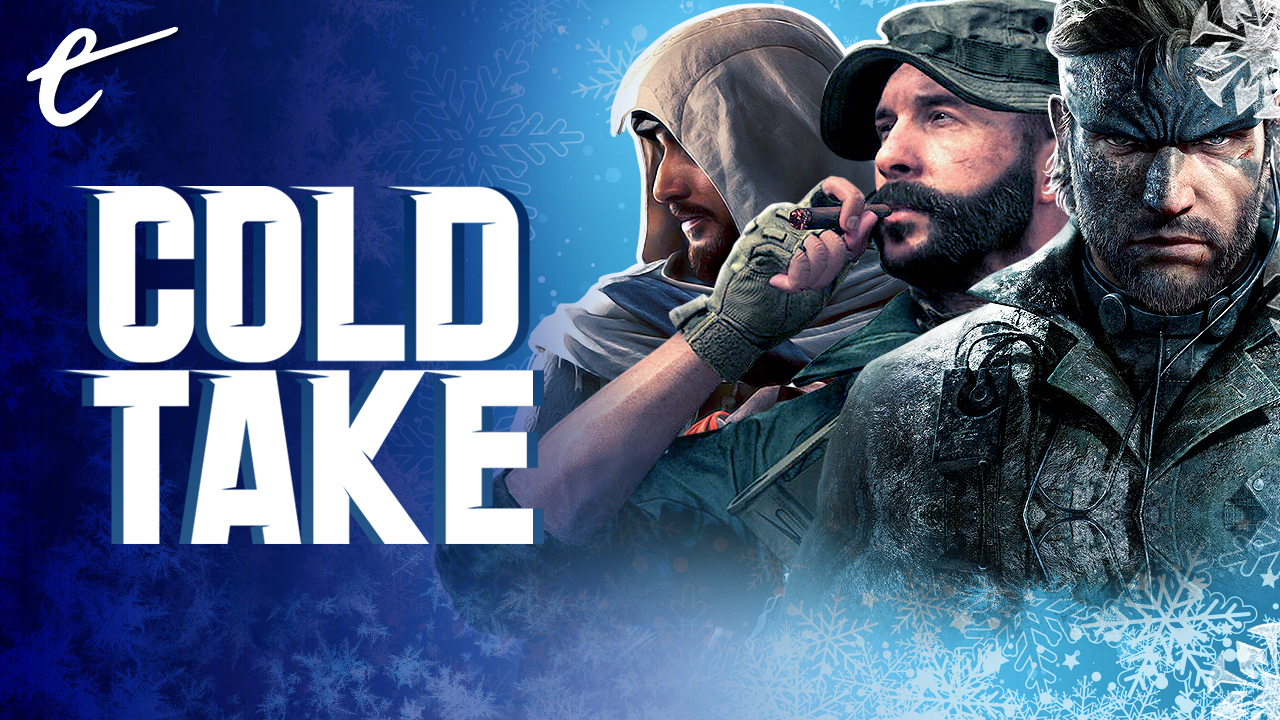This week on Cold Take, Sebastian takes a look at video game narratives and how they are designed around the medium of games, using The Last of Us on HBO and the video game as an example.
Transcript
There are light spoilers here and there. It’s kinda difficult to talk about The Last of Us without mentioning The Last of Us. Oh, and I die at the end too. Yea, it was the butler. How’d you know?
Neil Druckmann must’ve been eavesdropping on me back in 2013. Ten years later, The Last of Us: The Video Game is now a TV show and I couldn’t be happier. Coincidence? I think not. This show is everything a man like me could ever ask for. A man like me is the kind of guy who isn’t particularly fond of narrative based video games. Simply put, if I want to read a book I read a book. If I want to watch a cool story I turn on the telly. If I want to immerse myself in a uniquely tangible experience I go to video games. Each of these have a unique strength and they don’t do too well when they chase the strength of other mediums– That’s how video game based movies got their laughable reputation to begin with. Ughh boy. For me, narrative based video games occupy the same writing circles as choose-your-own-adventure books and Netflix’s Bandersnatch. You know the kind of narratives I’m talking about. The ones that are passable at best but think that by adding me into the mix everything will work out in the end. It’s quite the opposite. You should serve the audience the best narrative you can through the medium.
Imagine for a second that I’m pretentious and I’m in charge of creating a Hollywood blockbuster hit. I’ve been given a star studded cast, fantastic writers, and the backing of a major studio. Action. Close up shot of a sleeping child. Camera slowly pans left towards the offscreen sounds of a frustrated male. Phone and keys are in his left hand even though he is right handed. Why? To give a clear view of his facial expression and body language. Unrealistic. Sure, but it’s a great shot. Cut back to sleeping child now waking up. Center on the couch, but keep the shot tight. Tilt the camera upwards quickly. Show the clock. Now truck to the right, match the girl’s energy and movement. Expose the exposition, and the beat goes on. Eat your heart out, Scorsese. Now, for this next scene I have a vision. Let’s take all our production value, ball it up, and throw it out the window. Let’s mount the camera a few feet behind the little girl’s head and let all of the stage direction be given by a 14 year old, or perhaps a stoned out college grad, maybe even an overworked welder who’s already half a Dorito bag and a few brewskis into their three-day weekend. So long as you’ve got seventy bucks, I don’t discriminate.
The Last of Us has a great story. It’s worth a read. It’s definitely worth a watch. It’s just not worth my video game time because it doesn’t treat me like a gamer. It treats me like the cameraman in charge of framing the important characters and moments. I am the actor roped into doing all of my own stunts and hitting every live cue perfectly without prior rehearsal, but I am neither Cruise nor Brando. As a compromise for my middling performance I am given a meager button prompt to press every now and again in this story-driven game of charades. “Story-driven.” I don’t believe in the term so much as I don’t believe in letting the horse drive while I pull the carriage. Every game is player-driven, and my favorite video game narratives use that fact to create truly unique works. Even Disco Elysium, a severely narrative heavy game, has an impressive game system as its foundation for me to steer, but you won’t hear anyone mention mechanics because you spend 99% of your time dealing with dialogue.
Books have those fancy literary devices to engage me. Metaphors. Story structure. Composition. Why, I find punctuation to be an artform in its own right. Films and television have their own established disciplines as well to entice me. Camerawork. Lighting. Stage direction. Everything is tailored to make me care about the story. Games like Portal also adhere to rules of composition and story structure, but these serve the player first and foremost. It’s difficult to quantify how lean and well crafted it is until compared side-by-side with Portal 2, who is much more crass and likes to rub its narrative in my face, but the game still does its due diligence of attaching me to the game first. This is what it boils down to. My gripe with narrative based video games is they assume I care simply because I am in the story. Let me set that straight for ya. I am not in the game. The character I am controlling is in the game. I don’t magically gain any of Joel’s middle-aged footwear sensibilities or his post-apocalyptic dad grief simply because I’m the one in charge of moving him about in The Last of Us. I’m not the heartless one because I don’t care that my assigned avatar’s daughter doesn’t make it. I just met them. They might’ve called all this. Naughty Dog are the heartless ones for trying to emotionally manipulate me into caring about the characters they threw at me. I don’t negotiate with terrorists. How about aligning my player motivations with his character motivations instead of fridging his daughter to cash in on sympathy tout suite? Leave the kids out of this. Play to your strengths.
Games do nothing better. Literally, the concept of ‘nothing.’ I can be thrown into a room with a box and a few directions then be left to my own devices and have the story unfold through my action or inaction. It’s not just environmental story-telling, those can be pulled off in books and television, it’s apathy. Being able to layer detail upon detail, not caring whether I get the point or not, is the narrative strength of games like Undertale – and it’s been zero days since I’ve mentioned Dark Souls. And they don’t even have to be full blown novels. You’ve got your smaller narratives coming out of games like Moonscars and Tinkykin and Tunic. Those are my favorite kind of game narratives, the ones that just sneak up on you. They cause you to mentally flip or rewind the pages of your brain ‘cause “Woah! Where did that come from?” It’s because of the narrative apathy. Now you have my empathy. Television and books can’t not care, no matter how nonchalant they try to be. Every line, every scene, and every detail has been meticulously placed specifically for the viewer’s consumption. Not giving enough details, in either medium, is harshly criticized as poor sportsmanship and a lack of fundamentals. Likewise, being too overblown with the details, too bombastic, too over-the-top, I say too heavy handed with the seasonings also sets off red flags. This is where video games can exist in a realm no other narrative medium could ever reach, yet some games don’t reach it either because they don’t play to their strengths.
Meanwhile, The Last of Us: The Show: The Musical is another adaptation that knows and plays to its strengths. Its self-awareness is most evident in episode three where it departs from the source material to shine the spotlight on Bill and Frank’s excellent adventure, something that wasn’t shown in the game, because it made for better television. But the game shares Bill and Frank’s story through dialogue, cutscenes, and a note I pick up. Because the game is adamant about having narrative and gameplay, these moments feel like a forced compromise to maximize my presence while reducing my player agency for fear that I might ruin the narrative or get bored. In my case, I tend to do both. You just can’t have your cake and eat it. You can’t leave me in charge of the narrative and not have it ruined too. As far as I’m concerned, the cinematic approach of the show and the game are on par with one another, but I think The Show of Us understands its format better and excels within it while The Game of Us is good and then plummets in quality once it hands me the controls.
Perhaps I am the old fart having a hard time catching on to these new fangled TV shows that have gameplay in them. Yes, God of War: Ragnarok is bigger, more established, has better set pieces, impeccabler direction, and overall delivers a more heartfelt narrative, but Evil West remembers it is a video game and I am a gamer looking to game. It reminds me every time I’m handed weapon after weapon and drives the story along with my desire to unload high octane bad-assery, making me much more receptive to the story in the first place. Hellblade’s visual overload and choreographed madness are not something you can get from a book or a film trying to give a glimpse into psychosis, nor would you get it from a video game if the developers had chosen to focus on narrative first and compromised the player experience for it. Strange to think that in 2023 the tables have turned and these video game adaptations to television aren’t too bad. I say keep making more of the monstrous half-game half-tv show hybrids. They’ll make for great television some day. Oh my God. Maybe that’s it. Maybe that’s what they were trying to do in the first place. Make an overblown game. Make a TV show. People like me watch the show because they didn’t want to play the game. The show gives me the urge to play the game. I am not immune to propaganda.






Published: Feb 13, 2023 12:00 pm